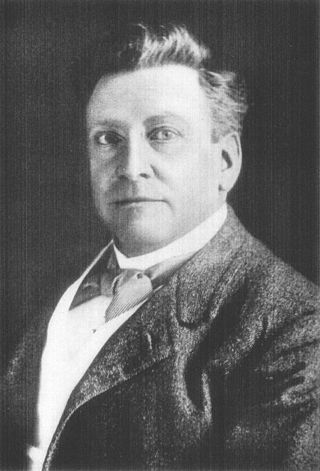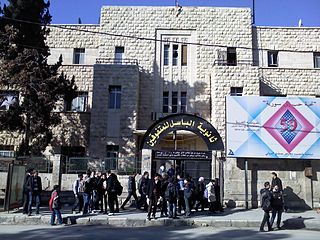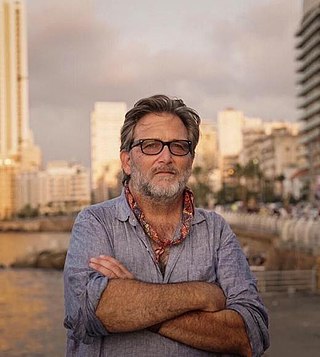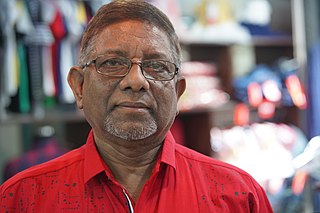Related Research Articles

The International Rescue Committee (IRC) is a global humanitarian aid, relief, and development nongovernmental organization. Founded in 1933 as the International Relief Association, at the request of Albert Einstein, and changing its name in 1942 after amalgamating with the similar Emergency Rescue Committee, the IRC provides emergency aid and long-term assistance to refugees and those displaced by war, persecution, or natural disaster. The IRC is currently working in about 40 countries and 26 U.S. cities where it resettles refugees and helps them become self-sufficient. It focuses mainly on health, education, economic wellbeing, power, and safety.
The Fulbright Program, including the Fulbright–Hays Program, is one of several United States Cultural Exchange Programs with the goal of improving intercultural relations, cultural diplomacy, and intercultural competence between the people of the United States and other countries through the exchange of persons, knowledge, and skills. Via the program, competitively-selected American citizens including students, scholars, teachers, professionals, scientists, and artists may receive scholarships or grants to study, conduct research, teach, or exercise their talents abroad; and citizens of other countries may qualify to do the same in the United States.
The German Academic Exchange Service, founded in 1925, is the largest German support organisation in the field of international academic co-operation.

The Leverhulme Trust is a large national grant-making organisation in the United Kingdom. It was established in 1925 under the will of the 1st Viscount Leverhulme (1851–1925), with the instruction that its resources should be used to support "scholarships for the purposes of research and education."
Education in Iraq is administered by the Ministry of Education.

Danish Refugee Council (DRC) is a private Danish humanitarian nonprofit organization, founded in 1956. It serves as an umbrella organization for 33 member organizations.

Education in the Syrian Arab Republic is given the necessary attention and care by the Syrian state, as the Syrian Constitution guarantees the right to education to every citizen, which is compulsory and free at primary level. It is free but not compulsory at the secondary level and higher education is available for a symbolic fee. the primary level includes 2 stages, 1 & 2 which include grades 1 to 6 while the secondary school includes grades 7 to 10

Medair is an international non-governmental organisation (INGO) whose purpose is to relieve human suffering in some of the world's most remote and devastated places. Medair aims to assist people affected by natural disasters and conflict to recover with dignity through the delivery of quality humanitarian aid.
The Albert Einstein German Academic Refugee Initiative Fund scholarship programme offers refugee students the possibility to pursue an undergraduate degree in their country of asylum. Through the dedicated support of the German Government, and additional private donors, UNHCR was able to support over 9,300 young refugees since 1992.
The Council for At-Risk Academics (CARA) is a charitable British organisation dedicated to assisting academics in immediate danger, those forced into exile, and many who choose to remain in their home countries despite the serious risks they face. Cara also supports higher education institutions whose continuing work is at risk or compromised. Cara offers academics support to continue their studies either by financially and logistically assisting scholars relocate to higher education institutions abroad or by assisting academics in their country of origin.

The Institute of International Education (IIE) is a 501(c) organization that focuses on international student exchange and aid, foreign affairs, and international peace and security. IIE creates programs of study and training for students, educators, and professionals from various sectors. The organization says its mission is to "build more peaceful and equitable societies by advancing scholarship, building economies, and promoting access to opportunity".
Scholars at Risk (SAR) is a U.S.-based international network of academic institutions organized to support and defend the principles of academic freedom and to defend the human rights of scholars around the world. Network membership includes over 530 higher education institutions in 42 countries.
A research fellow is an academic research position at a university or a similar research institution, usually for academic staff or faculty members. A research fellow may act either as an independent investigator or under the supervision of a principal investigator.
Zakat Foundation of America is a Chicago-based NGO providing emergency relief, post-disaster rehabilitation, sustainable development, education, healthcare, orphan sponsorship, and seasonal programs such as Ramadan iftars and Udhiya/Qurbani. Zakat Foundation of America is registered under 501(c)(3) as a non-profit charity organization.
The Emergency Committee in Aid of Displaced Foreign Scholars (1933–1945) assisted scholars who were barred from teaching, persecuted and threatened with imprisonment by the Nazis. The program began in Germany soon after Hitler took power and expanded to include Austria, Czechoslovakia, Norway, Belgium, the Netherlands, France and Italy. Prof. Philip Schwarz established this committee and sent 40 scientists to Turkey.

Keith David Watenpaugh is an American academic. He is Professor of Human Rights Studies at the University of California, Davis. A leading American historian of the contemporary Middle East, human rights, and modern humanitarianism, he is an expert on the Armenian genocide and its denial, and the role of the refugee in world history.
Qatar Charity is a humanitarian and development non-governmental organization in the Middle East. It was founded in 1992 in response to the thousands of children who were made orphans by the Afghanistan war and while orphans still remain a priority cause in the organization's work with more than 150,000 sponsored orphans, it has now expanded its fields of action to include six humanitarian fields and seven development fields.

Princess Ghida Talal is the chairperson of the board of trustees of the King Hussein Cancer Foundation and Center (KHCF) and (KHCC), based in Amman, Jordan. Born to a politically prominent family in Lebanon, Princess Ghida is married to Prince Talal bin Muhammad of Jordan, the nephew of King Hussein bin Talal and 41st-generation direct descendant of the Islamic prophet Muhammad.

Maimul Ahsan Khan is a Bangladeshi scholar of jurisprudence and comparative law and a former professor of law at the Faculty of Law, University of Dhaka. His expertise encompasses jurisprudence, Islamic law, Islam and Muslim culture, political science, human rights, Middle Eastern, South Asian and Oriental studies. He was awarded IIE-SRF fellowship for his academic contribution by the Institute of International Education (IIE). In 2012, the IIE Scholar Rescue Fund featured him as one of the persecuted academics in the world. Khan is currently serving as the Dean of the Faculty of Social Science at Leading University.
UniRef – University for Refugees – is a humanitarian non-governmental organization, specialized in delivering higher education for refugees, and headquartered in Geneva (Switzerland). In partnership with world-class universities and international humanitarian organizations, UniRef offers university courses to refugees and to people from the host community facing financial difficulties. In order to propose a training adapted to the specific living context of the community and in line with the demands from the local labor market, this NGO provides its own courses in cooperation with its partners.
References
- ↑ "Fellowships for Threatened Scholars Around the World". Scholar Rescue Fund. Retrieved 2023-09-14.
- 1 2 "Scholar Rescue Fund receives anonymous donation in honor of Beau Biden". Delaware Public Media. 8 April 2016. Retrieved 15 September 2023.
- ↑ Stiasny, Mary; Gore, Tim (10 February 2012). Going Global: The Landscape for Policy Makers and Practitioners in Tertiary Education. Emerald Group Publishing. pp. 46, 48. ISBN 978-0-85724-783-4 . Retrieved 26 March 2021.
- ↑ Coughlan, Sean (2 June 2016). "'Absolute fear': What it's like in a university run by IS". BBC News. Retrieved 26 March 2021.
- 1 2 3 "Our History | Scholar Rescue Fund". www.scholarrescuefund.org. Retrieved 2023-09-14.
- ↑ Smith, Nina; King, James (25 September 2021). "Academics, students need help to keep education hopes alive". University World News. Retrieved 15 September 2023.
- ↑ "Afghanistan". Scholar Rescue Fund. Retrieved 15 September 2023.
- ↑ "Iraq Scholar Rescue Project". Scholar Rescue Fund. Retrieved 15 September 2023.
- ↑ "Iraq Distance Learning Initiative". Scholar Rescue Fund. Retrieved 15 September 2023.
- ↑ Wallace-Thompson, Anna (19 July 2016). "This Organization Is Rescuing Artists and Scholars from Syria and Iraq". Artsy. Retrieved 15 September 2023.
- ↑ "Syria". Scholar Rescue Fund. Retrieved 15 September 2023.
- ↑ Balducci, Fabio (3 March 2023). "Ukraine: IIE makes increased commitment". The PIE News. Retrieved 15 September 2023.
- ↑ "Yemen". Scholar Rescue Fund. Retrieved 15 September 2023.
- ↑ "Announcing the IIE-SRF Alliance, a Global Partnership Initiative". Institute of International Education. 27 August 2020. Retrieved 15 September 2023.
- ↑ "US institute awards grants to 42 Bahamian college students affected by Hurricane Dorian". Eyewitness News. 15 November 2019. Retrieved 15 September 2023.
- ↑ Cascone, Sarah (27 May 2015). "Artist Protection Fund to Give Safe Haven to the Pussy Riots of the World". ArtNet. Retrieved 15 September 2023.
- ↑ "Online Effort Seeks to Connect Refugee Students With Scholarships". The Chronicle of Higher Education. University World News. 28 September 2016. Retrieved 15 September 2023.
- ↑ Hodan, Sophie (21 June 2023). "Int'l education marks World Refugee Day". The PIE News. Retrieved 15 September 2023.